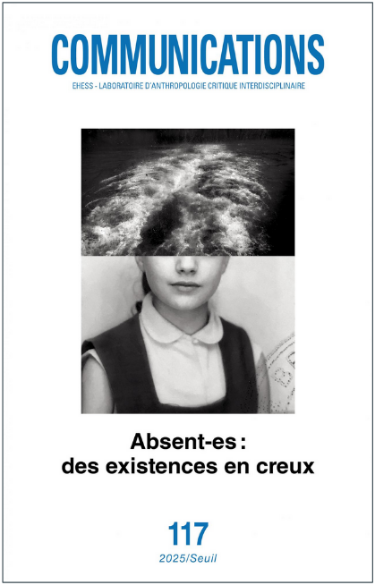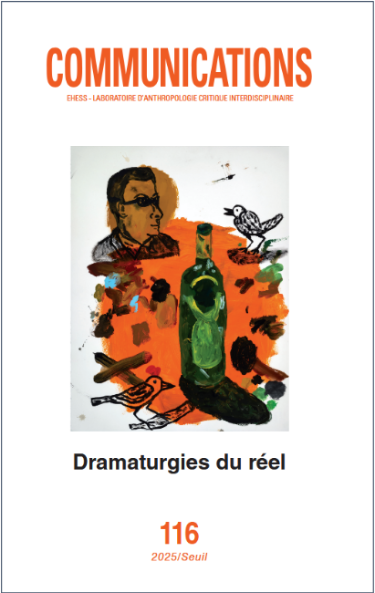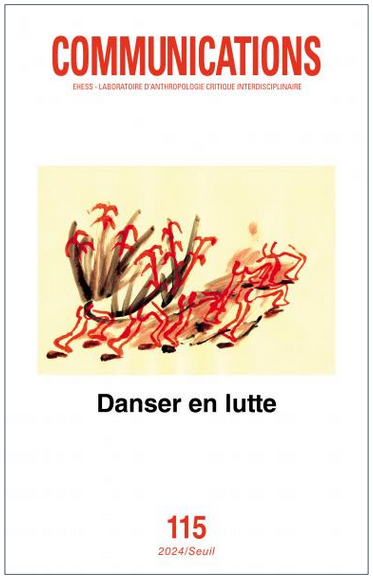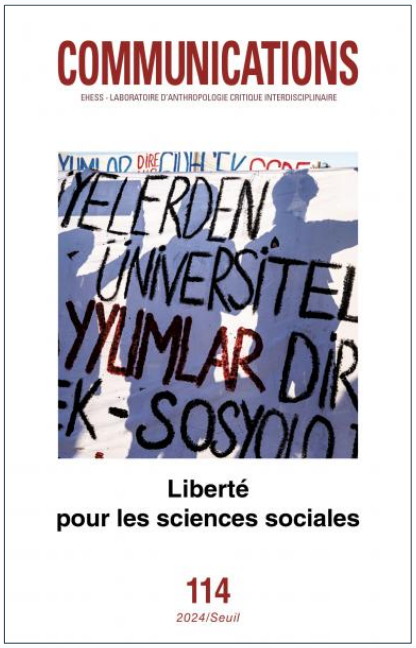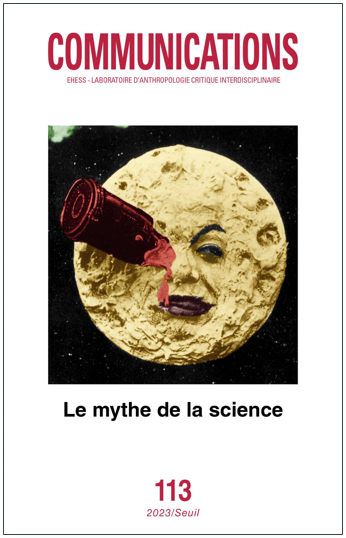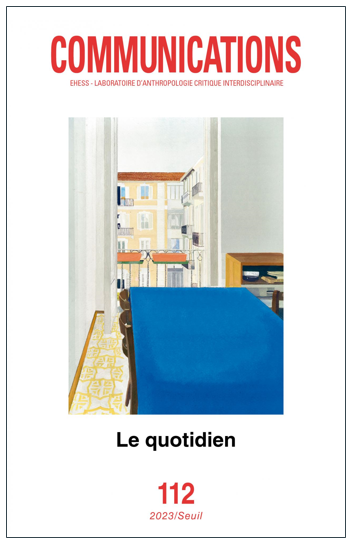About the journal
Presentation, Aims and Scope
A biannual thematic review, Communications was created in the autumn of 1961 by Georges Friedmann, Roland Barthes, and Edgar Morin. It has established itself as a reference in the field of the study of mass communications and semiological analyses in France, and has rapidly been acclaimed on the global scale. Since the 1980s, it has broadened its themes to include anthropo-social issues. It provides unpublished articles by both renowned scientists and junior researchers, opening up new avenues of research and promoting a high degree of transdisciplinarity. More than 1,500 contributions are now directly accessible, including, among many others, articles by Theodor W. Adorno, Philippe Ariès, Roland Barthes, Luc Boltanski, Jacqueline Carroy, Claudine Cohen, Danièle Cohn, Mireille Delmas-Marty, Mary Douglas, Umberto Eco, Arlette Farge, Didier Fassin, Moses Finley, Clifford Geertz, Félix Guattari, Évelyne Heyer, Nicole Lapierre, Sandra Laugier, Jacques Le Goff, Serge Moscovici, Michelle Perrot, Myriam Revault d’Allonnes, Régine Robin, Tzvetan Todorov, Georges Vigarello, Joëlle Zask…
The journal Communications is published by the Laboratoire d’anthropologie critique interdisciplinaire (LACI), a research team within the LAP, Laboratoire d’anthropologie politique (Centre national de la recherche scientifique, CNRS / École des hautes études en sciences sociales, EHESS). It is edited and distributed by Editions du Seuil. The journal is supported by CNRS Humanities & Social Sciences and the National Book Centre (CNL).
All issues of Communications are built around a theme. They aim to make the disciplines communicate and to define new research directions.
Online Access
The issues of the journal Communications published since 1961 are now available online,
- in open access on Persée and on Cairn,
- except for the latest issues, wich are available in restricted access (on an article basis) on Cairn (embargo period with access to subscribers via Cairn platform : 1 year).
→ Follow this link for direct access to Communications issues available in print and online, indexed by year and theme.
Just Published
« Absentees – Hollowed Existences »
Communications, Issue 117, November 2025
Edited by Michèle Baussant & Maria Couroucli
Adopting an interdisciplinary and cumulative perspective, this issue focuses not on absence but on those who are absent. Why and how does one become an absentee? How is this condition and status produced, and how do they affect individuals? The papers gathered here mobilize empirical data to expose how this status affects specific categories of marginalized or outcastindividuals in various socio-historical contexts, and question the boundaries—both spatial and material, as well as social and temporal—between those who are present and those who are absent.
→ See this issue on Cairn
→ Presentation in English
Previous Issue
« Dramaturgies of the Real. At the Intersection of Art and the Humanities and Social Sciences »
Communications, Issue 116, May 2025
Edited by Bernard Müller & Caterina Pasqualino
An increasing number of researchers in the humanities, anthropologists, sociologists, geographers and archaeologists are resorting to “artistic” schemes to carry out their fieldwork: film, theatre, opera, concert, sonography, performance, historical reenactment, etc. What is the heuristic consideration underpinning the mobilization of such “artistic” schemes to account for a social situation? Why engage in these new forms of exploration?
→ See this issue on Cairn
→ Presentation in English
Full Open Access
« Dancing for Fighting »
Communications, Issue 115, November 2024
Edited by Marie Glon & Bianca Maurmayr
“If I can’t dance, I don’t want to be part of your revolution”.
This quote frequently attributed to Emma Goldman resonates with many of the recent social mobilizations, which have been marked by dances and expressive gestures. Through several case studies and multiple disciplinary approaches, this issue how this phenomenon re-enacts the repertoires of social protest and questions the body’s relationship to politics, vulnerability, non-violence as well as to the forces of law and order. Where do its gestures stem from, what do they mean and what do they produce? To what risks do their polysemy and ambiguity expose them? We discover that while being an emancipating “technology of the self”, the act of dancing often opens up avenues for new fights, new questions and, sometimes, new fragmentations in social movements.
→ On Cairn
→ Presentation in English
Full Open Access
« Freedom for the Social Sciences »
Communications, Issue 114, May 2024
Edited by Nicole Lapierre, Évelyne Ribert
& Philippe Roussin
The human and social sciences have been the subject of disputes, rows, hostile behaviours and even attacks of a political nature in authoritarian regimes, “illiberal” democracies, and in liberal democracies alike. Such criticisms fall within the context of reforms aimed at integrating universities into a unified and competitive global knowledge market.
This issue of Communications takes stock of the threats targeting SHS in Europe, Africa, Asia and the United States. It also dwells on the epistemology of the SHS and finally ponders over and puts forward actions to secure academic freedom and institutional autonomy.
→ On Cairn
→ Presentation and articles in English
Full Open Access
« The myth of science »
Communications, Issue 113, November 2023
Edited by Antonella Romano
The relationship between societies and science inscribes itself a broader temporal framework. In the West, it has been structuring our history, and took a specific turn in the early modern period in the wake of the “scientific revolution”.
This volume discusses the history of knowledge, with the aim of questioning the multiple meanings the term “science” covers, so abundantly mobilized in the public and academic spheres.
The contemporary features and effects of these relationships determine both the responses and the stakes of economic choices: what models of (de)growth derive from the many technoscientific choices? What role should scientific expertise play in the political debate? What relation to labour and consumption does a given scientific innovation entail? These are just some of the questions addressed in this issue, relying on a widely shared assessment today: the non-neutrality of science and the constitutive nature of its relationship with politics.
→ On Persée
→ On Cairn
→ Presentation in English
→ Presentación y artículos en español
Full Open Access
« The Everyday Life »
Communications, Issue 112, May 2023
Edited by Véronique Nahoum-Grappe, Martyne Perrot
& Thierry Pillon
The Everyday Life alludes to a dual temporality. On the one hand, it is the temporality of the material and physical framework of a day. On the other hand, it alludes to the endless repetition of days, of so-called “daily” tasks. It is thus a challenge to describe the Everyday Life. How can the continuity and repetition, but at the same time the mundane and the exceptional be accounted for? If literature seems better equipped to nail it down, the everyday life has never ceased to be an object of inquiry for social sciences.
→ On Persée
→ On Cairn
→ Presentation in English
The editorial board of Communications is committed to the social movement protesting against the pension reform and against the law the Pluriannual Research Programming Law (LPPR). Attached to the values of solidarity, social justice and knowledge sharing, we oppose the progressive destruction of public service and the commodification of knowledge. Advocating independent, fundamental and quality research, we reject the fragmentation and the precarity that the LPPR induces for researchers, professors, doctoral students, post-doctoral students and research support staff (ITA and BIATSS). We are staunchly attached to the essential role of tenure posts, both for researchers and ITA and BIATSS staff, to ensure open and quality research, as well as of permanent funding, crucial for allowing the publication of a social sciences journal. We reject that the elaboration of knowledge and its transmission may be subjected to instrumental or economic rationales and the imposition of managerial apparatuses, based on competition, without taking into account the specific operating modes of research. We strongly oppose the imposition of precarious positions onto junior researchers and research support staff, leading to the sacrificing a generation who, despite the originality and quality of their work, is likely to be doomed to evolving in an insecure future due to the drastic cuts in the academic positions on offer.
ISSN
— Communications (Paris. 1962), ISSN 0588-8018 (print)
— Communications (Paris), ISSN 2102-5924 (online)

